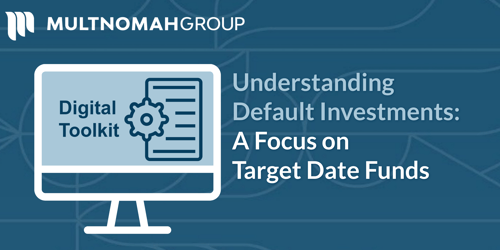As a plan sponsor, do you believe there are unique aspects to your retirement plan, participants, and/or the goals and objectives of your plan that are not incorporated into a series of the off-the-shelf target date fund (TDF) products? It's possible that a custom TDF could be appropriate for your plan. As we discussed in an earlier blog, inquiring about the use of custom TDFs is one of the steps in selecting and monitoring TDFs from the Department of Labor's guidance released in 2003.
Use the checklist of items below to test if you and your plan are a candidate for custom TDFs.
-
Are your participant demographics substantially different from available off-the-shelf TDFs?
- Expected retirement age
- Benefit program design (inclusion of a DB or retiree medical plan)
- Income (significantly higher or lower than national averages, e.g. professional services, service industry, etc.)
-
Does your Committee have preferences not offered via off-the-shelf TDFs?
- Traditional (stocks, bonds, cash) vs. non-traditional assets (these are sometimes referred to as diversifying asset classes)
- Active, passive or hybrid
- Non-traditional asset investment management techniques
-
Is your Committee comfortable with complexity?
- Developing and maintaining custom fund fact sheets
- Retaining and overseeing the custom funds’ investment advisor
- Reviewing the reasonableness of the fund fees
- Are the custom TDFs portable if a recordkeeper change was necessary
- Who will provide fund unitization (recordkeeper or separate custodian)
-
What are the all-in costs associated with custom TDFs?
- Recordkeeper
- Investment advisor
- Fund fees
If after reviewing the checklist, all four of the boxes are checked, your plan could be a good candidate for a custom TDF. If you need assistance navigating how to get started with custom TDFs, please reach out to Multnomah Group. We're here to help.

Interested in learning more about default investments? Our toolkit is focused on helping plan sponsors understand what default investment options are available and why target date funds are the most popular.
Multnomah Group is a registered investment adviser, registered with the Securities and Exchange Commission. Any information contained herein or on Multnomah Group’s website is provided for educational purposes only and does not intend to make an offer or solicitation for the sale or purchase of any specific securities, investments, or investment strategies. Investments involve risk and, unless otherwise stated, are not guaranteed. Multnomah Group does not provide legal or tax advice.


